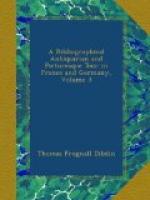These questions I submitted with great deference, and without the least hesitation, to the Vice Principal; who replied in such a manner as to induce me immediately to ascend the staircase, and commence a reconnaissance among the books placed above the gallery. The result of twenty minutes examination was, if not absolutely of the most gratifying kind, at least sufficient to induce me to offer twenty louis d’or for some thirty volumes, chiefly thin quartos, containing many Greek grammatical and philosophical tracts, of which I had never before seen copies. Some scarce and curious theological Latin tracts were also in this number. I turned the books upon their fore-edges, leaving their ends outwards, in order to indicate those which had been selected. M. Pallas told me that he could say nothing definitive in reply,[104] for that the matter must be submitted to the Prelate, or head of the monastery, who, at that time, was at Vienna, perhaps at the point of death. From the library we went to the church. This latter is situated between the two wings: the wings themselves forming the Saloon and the library. As we were about to leave the library, the Abbe observed—“Here, we have food for the mind: in the opposite quarter we dine—which is food for the body:[105] between both, is the church, which contains food for the soul.” On entering the corridor, I looked up and saw the following inscription (from 1 Mac. c. xii. v. 9.) over the library door: “Habentes solatio sanctos libros qui sunt in manibus nostris.” My next gratification was, a view of the portrait of BERTHOLDUS DIETMAYR—the founder, or rather the restorer, both of the library and of the monastery—possessing a countenance full of intelligence and expression. Beneath the portrait, which is scarcely half the size of life, is the following distich:
Bertholdi Dietmayr Quidquid Mortale,
Tabella,
Ingentemque animum BIBLIOTHECA, refert.
“There,” exclaimed the Abbe Strattman—“there you have the portrait of a truly great man: one of the three select and privy counsellors of the Emperor Charles VI. Dietmayr was a man of a truly lofty soul, of a refined taste, and of unbounded wealth and liberality of spirit. Even longer than this edifice shall last, will the celebrity of its founder endure.” My heart overflowed with admiration as I heard the words of the Abbe, gazing, at the same time, intently upon the portrait of the Prelate Dietmayr. Such men keep the balance of this world even.
On reaching the last descending step, just before entering the church, the Vice Principal bade me look upwards and view the cork-screw stair-case. I did so: and to view and admire was one and the same operation of the mind. It was the most perfect and extraordinary thing of the kind which I had ever seen—the consummation (as I was told) of that particular species of art. The church is




